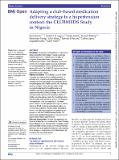| dc.contributor.author | Santo, Karla | |
| dc.contributor.author | Isiguzo, Godsent | |
| dc.contributor.author | Atkins, Emily | |
| dc.contributor.author | Mishra, Shiva Raj | |
| dc.contributor.author | Panda, Rajmohan | |
| dc.contributor.author | Mbau, Lilian | |
| dc.contributor.author | Fayomi1, Samuel B | |
| dc.contributor.author | Ugwu, Collins | |
| dc.contributor.author | Odili, Augustine | |
| dc.contributor.author | Virani, Salim | |
| dc.date.accessioned | 2022-04-11T19:44:20Z | |
| dc.date.available | 2022-04-11T19:44:20Z | |
| dc.date.issued | 2019-06-10 | |
| dc.identifier.citation | Santo K, Isiguzo GC, Atkins E, et al. Adapting a club-based medication delivery strategy to a hypertension context: the CLUBMEDS Study in Nigeria. BMJ Open 2019;9:e029824. doi:10.1136/ bmjopen-2019-029824 | en_US |
| dc.identifier.other | doi:10.1136/ bmjopen-2019-029824 | |
| dc.identifier.uri | https://repository.amref.ac.ke/handle/123456789/651 | |
| dc.description.abstract | Introduction The prevalence of hypertension in sub-Saharan
Africa is among the world’s highest; however, awareness,
treatment and control of hypertension in this region are
suboptimal. Among other barriers, the overburdened
healthcare system poses a great challenge for hypertension
control. Community peer-support groups are an alternative
and promising strategy to improve adherence and blood
pressure (BP) control. The CLUBMEDS study aims to evaluate
the feasibility and impact of adherence clubs to improve
hypertension control in Nigeria.
Methods and analysis The CLUBMEDS study will include
a formative (pre-implementation) qualitative evaluation, a
pilot study and a process (postimplementation) qualitative
evaluation. At the formative stages, focus group discussions
with patient groups and in-depth interviews with healthcare
providers, managers and key decision makers will be
conducted to understand the feasibility, barriers and
facilitators, opportunities and challenges for the successful
implementation of the CLUBMEDS strategy. The CLUBMEDS
pilot study will be implemented in two primary healthcare
facilities, one urban and one rural, in Southeast Nigeria. Each
adherence club, which consists of a group of 10–15 patients
with hypertension under the leadership of a role-model
patient, serves as a support group to encourage and facilitate
adherence, BP self-monitoring and medication delivery on
a monthly basis. A process evaluation will be conducted at
the end of the pilot study to evaluate the acceptability and
engagement with the CLUBMEDS strategy. To date, 104
patients were recruited and grouped into nine clubs, in which
patients will be followed-up for 6 months.
Ethics and dissemination The study was approved by the
University of Abuja Teaching Hospital and the Federal Teaching
Hospital Abakaliki Human Research Ethics Committees and all
patients provided informed consent. Our findings will provide
preliminary data on the potential effectiveness and acceptance
of this strategy in a hypertension context. Study findings will
be disseminated via scientific forums. | en_US |
| dc.description.sponsorship | © Author(s) (or their
employer(s)) 2019. Re-use
permitted under CC BY-NC. No
commercial re-use. See rights
and permissions. Published by
BMJ.
For numbered affiliations see
end of article.
Prepublication history for
this paper is available online.
To view these files, please visit
the journal online (http:// dx. doi.
org/ 10. 1136/ bmjopen- 2019-
029824) | en_US |
| dc.language.iso | en | en_US |
| dc.publisher | BMJ | en_US |
| dc.subject | Medication adherence | en_US |
| dc.subject | Peer-support groups | en_US |
| dc.subject | Adherence clubs | en_US |
| dc.subject | Hypertension | en_US |
| dc.subject | Anti-hypertensives | en_US |
| dc.title | Adapting a Club-based Medication Delivery Strategy to a Hypertension Context: The CLUBMEDS Study in Nigeria | en_US |
| dc.type | Article, Journal | en_US |

